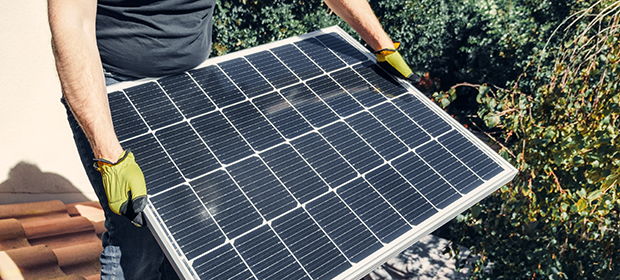During this year’s Spring Statement, Chancellor Rishi Sunak announced that the installation of energy-efficient systems will become VAT free in a bid to support households with rising energy bills.

Energy-efficient systems such as solar panels, insulation and heat pumps will all be VAT-free under this new scheme. The Chancellor suggested that taking advantage of this energy-efficient incentive could make a substantial difference to household energy bills, stating: “A family having a solar panel installed will see tax savings worth over £1,000 and savings on their energy bill of over £300 per year.”
In this article we’re focusing on solar panels, outlining their benefits and potential issues, and we’ll provide you with some useful calculations to help you evaluate how effective solar panels would be for your home specifically.
How Long Will Energy-Efficient Systems Be VAT-Free?
The scheme began in April this year and is set to run for 5 years, ending in 2027.
Would Installing Solar Panels Be Cost-Effective For My Home?
The installation of solar panels can cost anywhere between £6,000 to £10,000, depending on various factors such as the size of the system and the type of panels you use. Whilst the initial installation costs are expensive – even with VAT relief – solar panels usually begin to generate savings in a few years’ time.
In the above quote, The Chancellor stated that families could save over £300 a year on their energy bills, but a lot of this depends on factors such as where you live, how much electricity you use or where the panels are positioned, not to mention the weather! To find out how cost-effective solar panels could be for your home specifically, take a look at this solar panel calculator from Energy Saving Trust which gives a great estimation on potential costs and savings.
This GreenMatch article also offers some general advice about solar panel installation costs, along with some useful FAQs, to help you evaluate whether installing solar panels would be beneficial for you.
Will Solar Panels Affect my Mortgage / Re Mortgaging Options?
It’s true that solar panels can cause an issue when it comes to mortgages, but a lot of this depends on whether the panels are owned or leased. Generally speaking, mortgage lenders have become more accepting of solar panels that are owned and accept that solar panels are becoming more popular UK-wide.
The main issue arises if the solar panels are leased – an option that some may fall into if the solar panels were ‘free’ from the installer. This can lead to a range of different scenarios that can make things a bit trickier. According to Online Mortgage Advisor, some mortgage lenders may have strict stipulations on properties with leased solar panels, whereas other lenders may reject these properties altogether. Therefore, we recommend you speak to your mortgage lender to check that this isn’t going to be an issue for them, and consider carefully the differences between owning and leasing solar panels.
It’s an important consideration, especially if you’re expecting to either re mortgage in the future, or if you’re hoping to sell your home – as potential buyers’ lenders will have their own conditions relating to solar panels.

 © 2019 Warr & Co Chartered Accountants. Warr & Co Chartered Accountants is a member of The Institute of Chartered Accountants in England & Wales (ICAEW). Whilst the information detailed here is updated regularly to ensure it remains factually correct, it does not in any way constitute specific advice and no responsibility shall be accepted for any actions taken directly as a consequence of reading it. If you would like to discuss any of the points raised and / or engage our services in providing advice specific to your personal circumstances, please feel free to contact any one of the partners on 0161 477 6789 or contact us via our website forms. Warr & Co Chartered Accountants are registered to carry our audit work in the UK, our audit registration number is C002961684, for more information please visit www.auditregister.org.uk.
© 2019 Warr & Co Chartered Accountants. Warr & Co Chartered Accountants is a member of The Institute of Chartered Accountants in England & Wales (ICAEW). Whilst the information detailed here is updated regularly to ensure it remains factually correct, it does not in any way constitute specific advice and no responsibility shall be accepted for any actions taken directly as a consequence of reading it. If you would like to discuss any of the points raised and / or engage our services in providing advice specific to your personal circumstances, please feel free to contact any one of the partners on 0161 477 6789 or contact us via our website forms. Warr & Co Chartered Accountants are registered to carry our audit work in the UK, our audit registration number is C002961684, for more information please visit www.auditregister.org.uk.